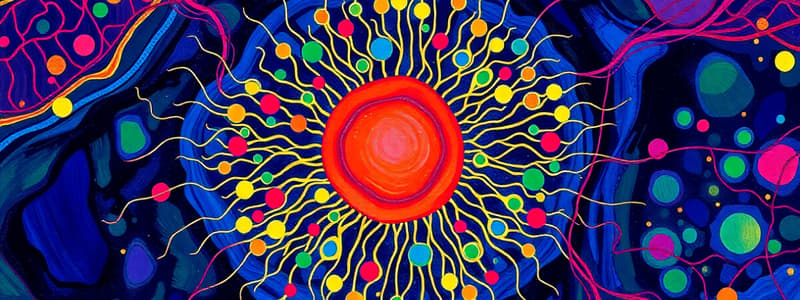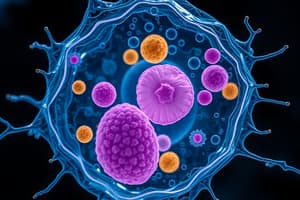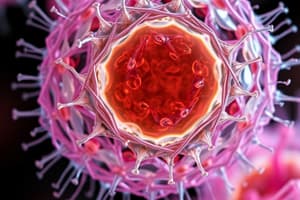Podcast
Questions and Answers
The chromatids are attached to microtubules by kinetochore during the prometaphase. To what part of the chromosome is kinetochore binding in this process?
The chromatids are attached to microtubules by kinetochore during the prometaphase. To what part of the chromosome is kinetochore binding in this process?
- A centriole
- A centrosome
- A centroplast
- A centromere (correct)
Axons are often wrapped by myelin, which comprises multiple membranes. What is the function of this structure?
Axons are often wrapped by myelin, which comprises multiple membranes. What is the function of this structure?
- insulation to prevent membrane potential diffusion (correct)
- insulation to prevent organelle leakage
- insulation to prevent warmth escape
- insulation to prevent cytosol leakage
What are essential hallmarks of all cells?
What are essential hallmarks of all cells?
- Cells are composed of cytosol containing biomolecules. (correct)
- Cells are composed of organelles attached to the cytoskeleton.
- Cells are composed of cytosol containing organelles.
- Cells are composed of genetic material that is divided over daughter cells.
APC/C is an important protein in the cell cycle. What is the role of APC/C?
APC/C is an important protein in the cell cycle. What is the role of APC/C?
The cross sections above are all made from the geometrical figure...
The cross sections above are all made from the geometrical figure...
In the EM picture of bone tissue above, three areas are indicated. What are these structures?
In the EM picture of bone tissue above, three areas are indicated. What are these structures?
Which of the following processes take place during the G1 phase of the cell cycle? Choose the best fit answer.
Which of the following processes take place during the G1 phase of the cell cycle? Choose the best fit answer.
What is the function of S/Cdk?
What is the function of S/Cdk?
In which branch of the tree of life do you find multicellular organisms?
In which branch of the tree of life do you find multicellular organisms?
Which organelle is indicated by number 1 in the EM picture above?
Which organelle is indicated by number 1 in the EM picture above?
At which checkpoint numbered in the picture above are all cyclins degraded?
At which checkpoint numbered in the picture above are all cyclins degraded?
In the electron microscope collagen fibres show a striped pattern, what causes this pattern?
In the electron microscope collagen fibres show a striped pattern, what causes this pattern?
In the TED talk by professor Clevers two advantages are mentioned of stem cell therapy. Which ones are these?
In the TED talk by professor Clevers two advantages are mentioned of stem cell therapy. Which ones are these?
What component is part of an electron microscope but is not present in light microscopes?
What component is part of an electron microscope but is not present in light microscopes?
In a desmosome are located:
In a desmosome are located:
With which statement do you agree?
With which statement do you agree?
Integrin molecules
Integrin molecules
When a G-protein binds to an activated receptor, then:
When a G-protein binds to an activated receptor, then:
The length of an actin filament is determined by:
The length of an actin filament is determined by:
The Signal Recognition Particle (SRP):
The Signal Recognition Particle (SRP):
The chaperone PDI is kept in the endoplasmic reticulum (ER) by:
The chaperone PDI is kept in the endoplasmic reticulum (ER) by:
Pinocytosis is:
Pinocytosis is:
Mannose-6-phosphate is a targeting signal for:
Mannose-6-phosphate is a targeting signal for:
Most mitochondrial proteins are made:
Most mitochondrial proteins are made:
Flashcards
What does the kinetochore bind to during prometaphase?
What does the kinetochore bind to during prometaphase?
The kinetochore is a protein complex that attaches chromosomes to microtubules during cell division. It binds to the centromere, the constricted region of the chromosome where sister chromatids are joined.
What's the function of myelin?
What's the function of myelin?
Myelin is a fatty substance that wraps around axons, providing insulation. This insulation helps to prevent the diffusion of the electrical signal along the axon, improving the efficiency of nerve impulse transmission.
What are the essential hallmarks of all cells?
What are the essential hallmarks of all cells?
All cells are defined by the presence of cytosol, a fluid that contains biomolecules such as proteins, lipids, and nucleic acids. This fluid provides a medium for essential cellular processes and houses organelles.
What is the role of APC/C in the cell cycle?
What is the role of APC/C in the cell cycle?
Signup and view all the flashcards
What geometrical figure is represented by these cross-sections?
What geometrical figure is represented by these cross-sections?
Signup and view all the flashcards
Identify the structures numbered 1, 2, and 3 in the EM picture of bone tissue.
Identify the structures numbered 1, 2, and 3 in the EM picture of bone tissue.
Signup and view all the flashcards
What processes occur during the G1 phase of the cell cycle?
What processes occur during the G1 phase of the cell cycle?
Signup and view all the flashcards
What is the function of S/Cdk?
What is the function of S/Cdk?
Signup and view all the flashcards
In which branch of the tree of life do you find multicellular organisms?
In which branch of the tree of life do you find multicellular organisms?
Signup and view all the flashcards
What organelle is indicated by number 1 in the EM picture?
What organelle is indicated by number 1 in the EM picture?
Signup and view all the flashcards
At which checkpoint in the picture are all cyclins degraded?
At which checkpoint in the picture are all cyclins degraded?
Signup and view all the flashcards
Why do collagen fibers show a striped pattern in the electron microscope?
Why do collagen fibers show a striped pattern in the electron microscope?
Signup and view all the flashcards
What are two advantages of stem cell therapy discussed in the TED talk by Professor Clevers?
What are two advantages of stem cell therapy discussed in the TED talk by Professor Clevers?
Signup and view all the flashcards
Arrange these structures from biggest to smallest: mitochondrion, nucleus, ribosome, water molecule
Arrange these structures from biggest to smallest: mitochondrion, nucleus, ribosome, water molecule
Signup and view all the flashcards
What component is present in electron microscopes but not in light microscopes?
What component is present in electron microscopes but not in light microscopes?
Signup and view all the flashcards
What are located in a desmosome?
What are located in a desmosome?
Signup and view all the flashcards
Which nucleotide plays a similar role in actin and tubulin polymerization?
Which nucleotide plays a similar role in actin and tubulin polymerization?
Signup and view all the flashcards
What are integrin molecules involved in?
What are integrin molecules involved in?
Signup and view all the flashcards
What happens when a G-protein binds to an activated receptor?
What happens when a G-protein binds to an activated receptor?
Signup and view all the flashcards
What determines the length of an actin filament?
What determines the length of an actin filament?
Signup and view all the flashcards
What is the function of the Signal Recognition Particle (SRP)?
What is the function of the Signal Recognition Particle (SRP)?
Signup and view all the flashcards
What keeps the chaperone PDI in the endoplasmic reticulum?
What keeps the chaperone PDI in the endoplasmic reticulum?
Signup and view all the flashcards
What is pinocytosis?
What is pinocytosis?
Signup and view all the flashcards
What is mannose-6-phosphate?
What is mannose-6-phosphate?
Signup and view all the flashcards
Where are most mitochondrial proteins made?
Where are most mitochondrial proteins made?
Signup and view all the flashcards
Study Notes
Question 1
- Chromatids attach to microtubules via kinetochores during prometaphase
- Kinetochores are located on the centromere of a chromosome
Question 2
- Myelin is a multi-layered structure wrapping axons
- Myelin insulates axons, preventing cytosol leakage
Question 3
- Essential cell characteristics include cytosol containing organelles
- Cytosol contains biomolecules
- Organelles are attached to the cytoskeleton
- Genetic material is divided amongst daughter cells
Question 4
- APC/C is a crucial protein in the cell cycle
- It regulates the metaphase/anaphase checkpoint, particularly through degrading separase enzyme
- APC/C is not involved in DNA duplication nor directly degrading all cyclins
- APC/C does not regulate the G1/M-phase checkpoint by separase enzyme degradation
Question 5
- Cross-sections illustrated are geometrical figures
- Possible figures are cylinders, tetrahedrons, and cuboids
Question 6
- EM image of bone tissue shows three marked areas
- These areas represent different bone cells: osteoblast, osteoclast, and osteocyte
Question 7
- Key processes occurring during the G1 phase of the cell cycle are the synthesis of new organelles and centrosomes
- DNA synthesis does not take place in G1
Question 8
- S/Cdk is a critical protein or enzyme complex.
- This complex initiates DNA replication
Question 9
- Multicellular organisms reside in the domain Eukaryotes
Question 10
- Organelle number 1 in the EM image is the endoplasmic reticulum
Question 11
- All cyclins are degraded at the M-phase checkpoint.
Question 12
- Collagen fibers exhibit a striped pattern due to the overlap of tropocollagen elements
- The pattern is not caused by actin/myosin association, calcium binding, or an artifact from preparation
Question 13
- Two advantages of stem cell therapy include the ability to transplant an organ part
- Stem cell therapy can also alleviate the need for patient medication
Question 14
- From largest to smallest, the structures are nucleus, mitochondrion, ribosome, and water molecules
Question 15
- Electron microscopes utilize components lacking in light microscopes
- One example is the objective lens
Question 16
- Desmosomes contain cadherins and keratin, not connexins or hyaluronic acid
Question 17
- GTP hydrolysis is pivotal in tubulin polymerization, a process similar to actin polymerization
- ATP and GTP play essential roles
Question 18
- Integrins' function encompasses binding to intermediate filaments
- They connect intermediate filaments to the cell membrane, and are not directly linked to collagen
Question 19
- G-protein activation occurs when an activated receptor binds to the G-protein
- GTP conversion to GDP takes place in this G-protein activation event and cAMP is not generated as an immediate consequence
Question 20
- The length of an actin filament is dictated by capping proteins, not voltage, protein count, or breakdown
Question 21
- Signal Recognition Particle (SRP) facilitates protein degradation, binds ER signal peptides and SRP receptor on the plasma membrane
- SRP plays a role in recognizing KDEL sequences but doesn't stop translation after ER signal peptide binding
Question 22
- Proteins in the endoplasmic reticulum (ER) are retained by a C-terminal KDEL signal, it's not a lipid or carbohydrate linkage.
Question 23
- Pinocytosis is an indiscriminate membrane invagination, not receptor-mediated, nor a form of exocytosis
- It's used for cellular uptake but isn't the most efficient mechanism for cholesterol uptake.
Question 24
- Mannose-6-phosphate is a targeting signal for lysosomes, not the Golgi network, peroxisomes, or cell nucleus.
Question 25
- Most mitochondrial proteins are synthesized in the cytosol and actively imported into mitochondrial matrix (not made inside the mitochondrion), not made directly in the nucleus or ER.
Studying That Suits You
Use AI to generate personalized quizzes and flashcards to suit your learning preferences.




